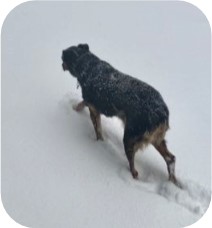Embrace the Changes in Your Senior Dog
By Robert Pregulman
This month we welcome guest blogger, Robert Pregulman, who runs Seattle DogSpot, a comprehensive resource for all things dog in the Seattle area, including dog friendly businesses, dog event calendar, and a blog about dog-related issues. In this blog Robert shares his thoughts about living with a senior dog. Thank you, Robert. We look forward to hearing more from you.
My wife and I met Miguel in November 2006 on a trip to San Miguel d’Allende in Mexico with our business partners. When traveling in Mexico you’ll see streets filled with stray dogs. Spaying/neutering pets has not permeated the dog owning culture there as it has in the US. Most of the strays spend the day either lying in the sun or scavenging for food. They are generally friendly because no one is going to give a handout to a growling, mean dog.
Miguel first caught my attention as I walked around town on my own. Most of the strays I saw rarely approached humans, but there was Miguel, trotting after people hoping they’d give him a handout. His appearance also caught my eye. He was a medium sized, German Shepherd-looking guy with no tail. The tops of his ears bounced up and down as he trotted after people with confidence and purpose.
Later that day when I told my wife about the cute stray dog I saw, she told me she had seen the same dog! He walked up to her while she was eating outside. After she gave him bit of food he fell asleep with his head on her foot. Because we both noticed him the same day we decided Miguel was destined to come home with us. We agreed that if we saw him again we’d take him home. Of course we did see him again, and a few days later he was with us in Seattle.
Watching Your Dog Get Old
Miguel is an old man now. Or to put it more nicely, he’s a senior dog. His veterinarian estimated he was between six months to a year old when we brought him here, so this fall he’ll be about 16-years-old.
In my experience, watching a dog grow old isn’t a gradual, linear occurrence that happens bit by bit, day by day. You don’t see the appearance of every gray hair or hear every change in the tone of his voice or notice every difference in his demeanor. And even when you do happen to notice a change, you don’t always realize (or want to realize) your dog is entering/close to entering the final stage of his life.
Signs My Dog is Getting Old
I don’t remember exactly when I realized Miguel crossed the line from the adult dog stage of his life to his senior dog stage. But after he tore a ligament in one leg, damaged a tendon in another leg, endured emergency gall bladder surgery, and developed new behavior quirks and habits, I knew he had entered the old geezer stage of his life.
Here are the signs Miguel is a senior dog now:
Arthritis
Miguel can no longer stand up or lie down easily. It takes a lot effort for him to gather his legs underneath so he can stand. To lie down he can no longer just flop on the floor; instead, he has to do a play bow and then sloooowly take small steps backwards with his hind legs until he’s on the floor.
His rickety, unsteady legs can no longer keep up with his sister Haley on walks either. We now have to stop often and wait for him to catch up.
He also demanded a more comfortable bed. One day he just started barking at his bed, refusing to get in it. When I finally got the message I bought him an orthopedic bed with a memory foam, and the barking stopped! Now he has a nicer mattress than I do.
Miguel’s former vet recommended adequan to relieve his joint pain, and so far it has worked exceptionally well.
He also takes fish oil and glucosamine for his arthritis as well as a daily dose of tramadol, an opioid that provides pain relief.
Although a new bed or supplements don’t completely eliminate Miguel’s arthritis pain, they have made it much more bearable.
Less Exercise
Miguel used to need two hour-long walks a day for exercise or he would bounce off the walls at home. One forty minute walk a day is all he needs now.
I also make sure he gets mental stimulation by letting him sniff around the yard a few times a day.
Fecal Incontinence
Miguel occasionally poops in the house without realizing it. Sometimes he does it in bed, and sometimes he does it while he’s walking.
This behavior has a name– Fecal Incontinence – and it is not an unusual occurrence with senior dogs. A number of physical/cognitive problems related to aging can cause fecal incontinence, including weakened or damaged anal sphincter muscles, spinal nerve damage, or cognitive decline.
I don’t know the specific cause of Miguel’s fecal incontinence. Fortunately it only happens periodically and his feces are pretty firm so clean up isn’t difficult.
Loss of Appetite
Like most humans, dogs eat less as they age. Miguel has never been a big eater but now he eats about 75% less food than he did when he was younger. Sometimes he’ll skip a couple of meals in a row.
Disorientation/Dementia
Miguel often stands in one place for several minutes staring at nothing in particular. He looks like me when I stand in a room wondering what I was going to do. He’ll also walk back and forth between the front and back door multiple times like he wants to go out but ends up staring out the door until he turns around and goes to the other door. If these behaviors last more than a couple of minutes I’ll stand next to him and ask if wants to go outside or get in his bed. This usually helps him snap out of it.
Hearing Loss
Miguel used to be a pretty stubborn dog and often pretended not to hear me when I asked him to do something. Now if he ignores a command it’s because he can’t hear me.
I watch Miguel closely now when I talk to him to see some sign that he heard what I said like flicking his ears toward me or turning his head. I also use hand movements sometimes to get his attention before speaking to him.
Please remember that if your dog exhibits any of these behaviors I mentioned you should take him to the vet for a comprehensive exam to determine if they’re caused by some other medical issue other than aging.
Once your vet figures out the cause(s) of these issues he/she should work with you to develop a plan to treat them.
Embrace the Changes in Your Senior Dog
Seeing these new behaviors/physical changes in your dog can be shocking and scary, especially for someone who has never had a senior dog.
And these changes can still be heartbreaking to someone who has experience with senior dogs. Watching Miguel struggle to stand up or climb stairs not only crushes my heart; it also reminds me that he won’t be around much longer.
But senior dogs also develop behaviors that enrich and strengthen your relationship. Aging can smooth the rough edges of a dog with a hyperactive or dominant personality. Miguel is much calmer now. He no longer tries to dominate or challenge other dogs when he meets them. “Live and let live” is his new motto.
Aging can also drastically change a dog’s behavior with humans. Because he was most likely abused when he lived on the streets, Miguel used to be extremely distrustful of people he didn’t know. Usually it would take several weeks before he would allow someone new to pet him or leash him up for a walk.
Now Miguel will walk up to strangers and shamelessly ask for pets. He never did for the first 13 years of his life.
Also, I no longer have to tell guests in my house to ignore Miguel and not make eye contact with him, which many dogs take as a sign of dominance. Now, Miguel gladly solicits pets from new guests almost as soon as they walk in door.
Finally, senior dogs don’t need multiple walks a day or require much activity to keep them engaged. They’re just happy to be with you. Your company, along with an occasional butt scratch or tummy rub of course, is all they want.
One of my favorite things Miguel does now happens when he’s sleeping in his bed while I’m working or watching TV. Occasionally he’ll open one eye to check if I’m still there. When he sees me he closes his eye, lets out a deep, satisfying sigh, and falls back asleep.
I love that sound.
So, as your dog ages, don’t despair about changes in his behavior or worry he may pass away soon. Instead, adjust to the “new normal” of his life, embrace the positive changes in his behavior, and appreciate the time you and your senior dog have left together.







